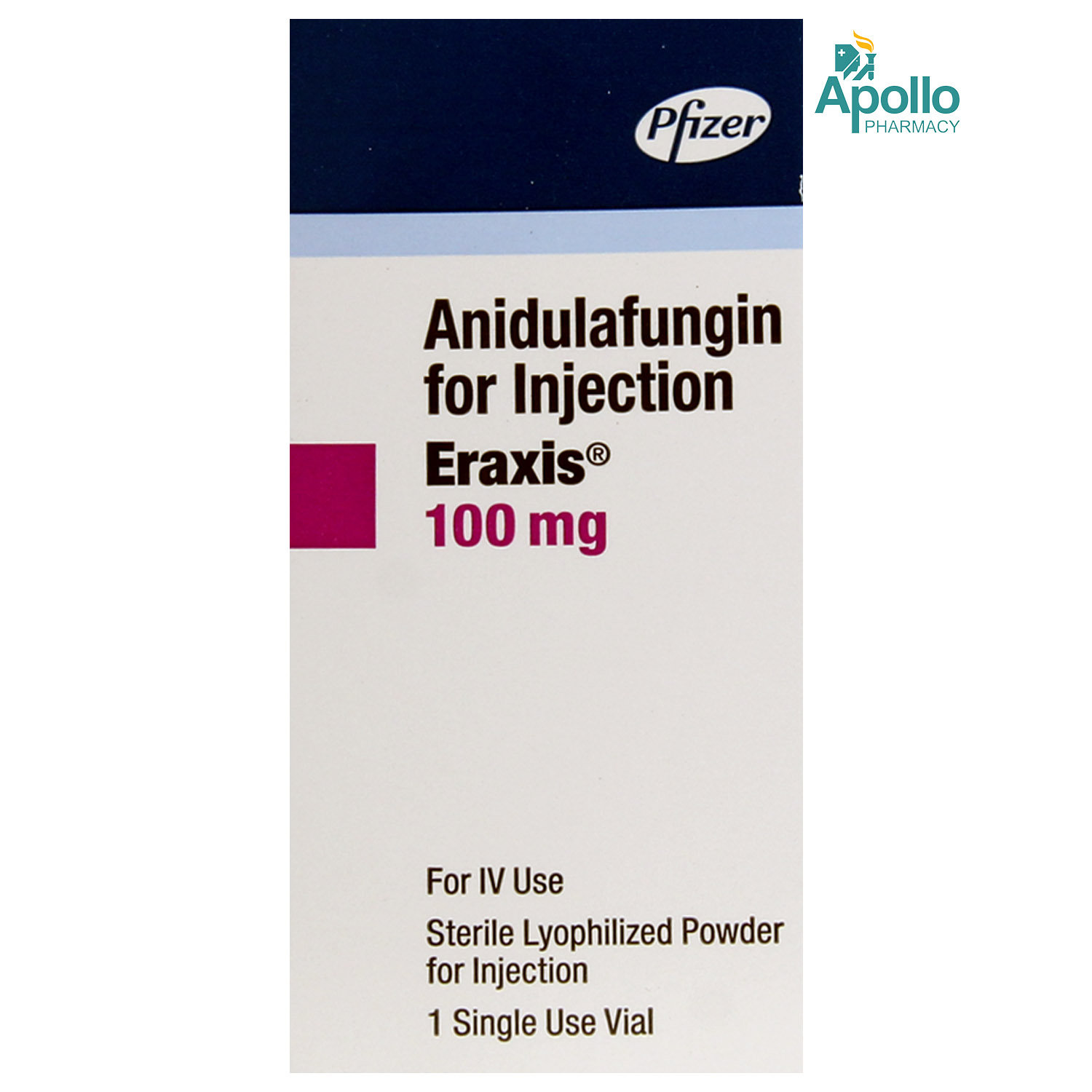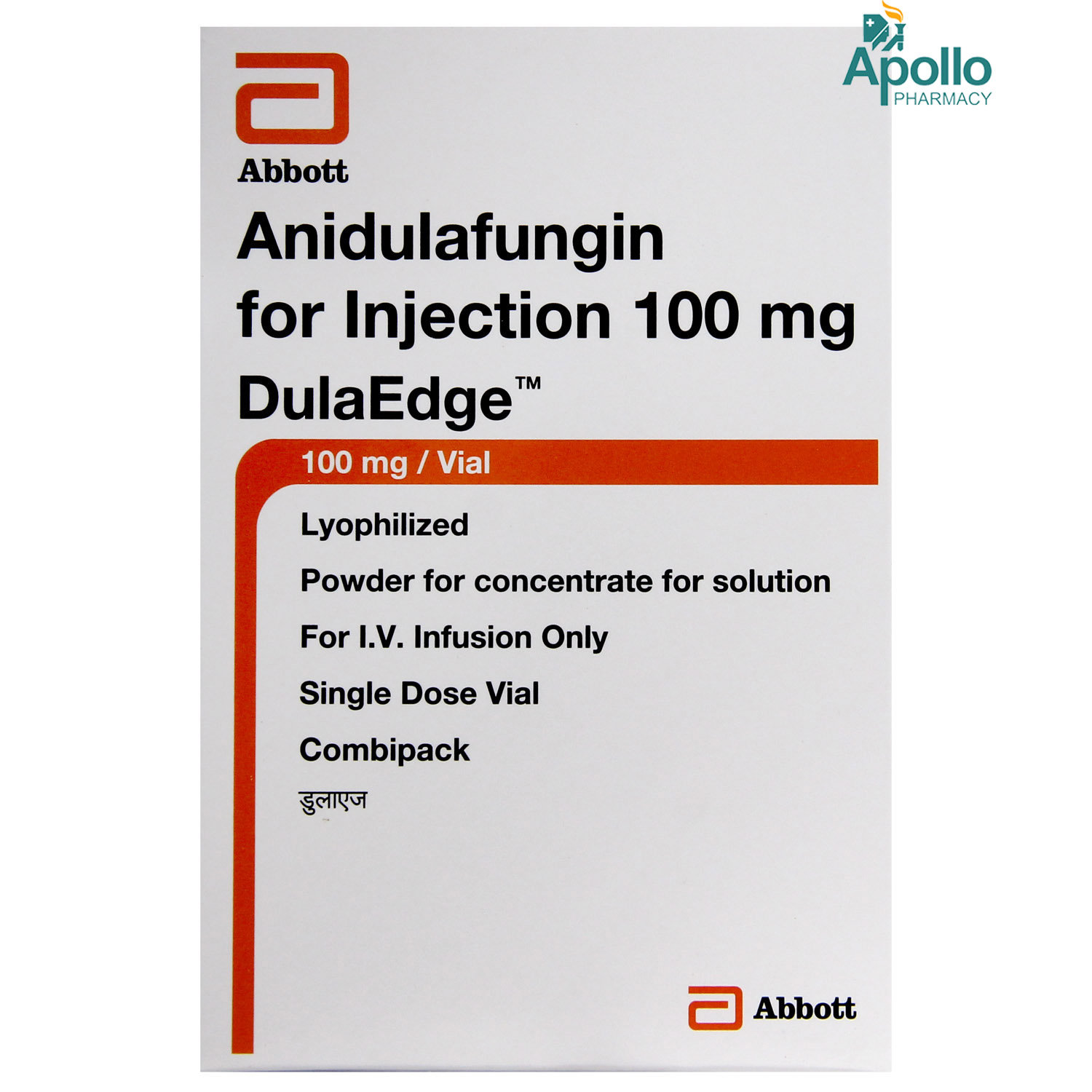Anicord 100 mg Injection 1's
MRP ₹11858
(Inclusive of all Taxes)
₹1778.7 Cashback (15%)
Provide Delivery Location
Online payment accepted
 Prescription drug
Prescription drugWhats That
Composition :
Manufacturer/Marketer :
Consume Type :
Expires on or after :
Return Policy :
About Anicord 100 mg Injection
Anicord 100 mg Injection belongs to the class of medicines called antifungals used to treat invasive candidiasis. Invasive candidiasis is a type of fungal infection of the blood or other internal organs caused by yeast (a type of fungus) called Candida.
Anicord 100 mg Injection contains Anidulafungin, which works by preventing the normal development of fungal cell walls by making them fragile or unable to grow. Thus, Anicord 100 mg Injection kills fungus and helps to treat fungal infection.
Anicord 100 mg Injection will be administered by a healthcare professional; do not self-administer. Anicord 100 mg Injection may cause common side effects such as nausea, diarrhoea, hypokalaemia (low blood potassium), headache, vomiting, or difficulty breathing. Most of these side effects of Anicord 100 mg Injection gradually resolve over time and do not require medical attention. However, if the side effects worsen or persist, please consult your doctor.
Please tell your doctor if you are allergic to Anidulafungin, caspofungin, or any other medicines. Anicord 100 mg Injection is not recommended for use during pregnancy. If you are of childbearing age, effective contraception should be used. If you are a nursing mother, take your doctor’s advice before receiving Anicord 100 mg Injection.
Uses of Anicord 100 mg Injection
Invasive candidiasis
Directions for Use
Anicord 100 mg Injection will be administered by a healthcare professional; do not self-administer.
Key Benefits
Anicord 100 mg Injection contains Anidulafungin, an antifungal drug which prevents the normal development of fungal cell walls by making them fragile or unable to grow. Thus, Anicord 100 mg Injection kills fungus and helps to treat fungal infections of blood or other internal organs.
Storage
- Inform your doctor about the medication you're taking and the UTI symptoms you're experiencing.
- Your doctor may adjust your medication regimen or consider alternative medications or dosages that may reduce the risk of UTIs.
- Drink plenty of water (at least 8-10 glasses a day) to help flush out bacteria. Avoid sugary drinks and caffeine, which can exacerbate UTI symptoms.
- Urinate when you feel the need rather than holding it in. This can help prevent bacterial growth and reduce the risk of UTIs.
- Consider cranberry supplements: Cranberry supplements may help prevent UTIs by preventing bacterial adhesion.
- Monitor UTI symptoms and report any changes to your doctor.
- If antibiotics are prescribed, take them as directed and complete the full course.
- Inform your doctor about the nausea and discuss possible alternatives to the medication or adjustments to the dosage.
- Divide your daily food intake into smaller, more frequent meals to reduce nausea.
- Opt for bland, easily digestible foods like crackers, toast, plain rice, bananas, and applesauce.
- Avoid certain foods that can trigger nausea, such as fatty, greasy, spicy, and smelly foods.
- Drink plenty of fluids, such as water, clear broth, or electrolyte-rich beverages like coconut water or sports drinks.
- Use ginger (tea, ale, or candies) to help relieve nausea.
- Get adequate rest and also avoid strenuous activities that can worsen nausea.
- Talk to your doctor about taking anti-nausea medication if your nausea is severe.
- Record when your nausea occurs, what triggers it, and what provides relief to help you identify patterns and manage your symptoms more effectively.
- Inform Your Doctor: Notify your doctor immediately about your diarrhoea symptoms. This allows them to adjust your medication or provide guidance on managing side effects.
- Stay Hydrated: Drink plenty of fluids to replace lost water and electrolytes. Choose water, clear broth, and electrolyte-rich drinks. Avoid carbonated or caffeinated beverages to effectively rehydrate your body.
- Follow a Bland Diet: Eat easy-to-digest foods to help firm up your stool and settle your stomach. Try incorporating bananas, rice, applesauce, toast, plain crackers, and boiled vegetables into your diet.
- Avoid Trigger Foods: Steer clear of foods that can worsen diarrhoea, such as spicy, fatty, or greasy foods, high-fibre foods, and dairy products (especially if you're lactose intolerant).
- Practice Good Hygiene: Maintain good hygiene to prevent the spread of infection. To stay healthy, wash your hands frequently, clean and disinfect surfaces regularly, and avoid exchanging personal belongings with others.
- Take Anti-Diarrheal Medications: If your doctor advises, anti-diarrheal medications such as loperamide might help manage diarrhoea symptoms. Always follow your doctor's directions.
- Keep track of your diarrhoea symptoms. If they don't get better or worse or are accompanied by severe stomach pain, blood, or dehydration signs (like extreme thirst or dark urine), seek medical help.
- Preventing Vomiting (Before it Happens)
- Take medication exactly as prescribed by your doctor. This can help minimize side effects, including vomiting.
- Having a small meal before taking your medication can help reduce nausea and vomiting.
- Talk to your doctor about taking anti-nausea medication along with your prescribed medication.
- Managing Vomiting (If it Happens)
- Try taking ginger in the form of tea, ale, or candy to help alleviate nausea and vomiting.
- What to Do if Vomiting Persists
- Consult your doctor if vomiting continues or worsens, consult the doctor for guidance on adjusting your medication or additional treatment.
- Inform your doctor immediately if you experience a fever after starting a new medication.
- Your doctor may adjust your medication regimen or dosage as needed to minimize fever symptoms.
- Monitor your body temperature to monitor fever progression.
- Drink plenty of fluids, such as water or electrolyte-rich beverages, to help your body regulate temperature.
- Get plenty of rest and engage in relaxation techniques, such as deep breathing or meditation, to help manage fever symptoms.
- Under the guidance of your doctor, consider taking medication, such as acetaminophen or ibuprofen, to help reduce fever.
- If your fever is extremely high (over 103°F), or if you experience severe symptoms such as confusion, seizures, or difficulty breathing, seek immediate medical attention.
- Talk to your doctor about oral potassium supplements.
- Eat potassium rich foods such as bananas, avocados, oranges, dark leafy greens, beans and peas, fish, spinach, milk and tomatoes.
Drug Warnings
If you are allergic to Anidulafungin, caspofungin or any other medicines, please tell your doctor. Anicord 100 mg Injection is not recommended for use during pregnancy. If you are of childbearing age, effective contraception should be used. If you are a nursing mother, take your doctor’s advice before receiving Anicord 100 mg Injection. If you develop liver problems during your treatment with Anicord 100 mg Injection, your doctor may monitor you more closely for liver function.
Drug-Drug Interactions
Drug-Drug Interactions
Login/Sign Up
Drug-Food Interactions
Drug-Food Interactions
Login/Sign Up
Diet & Lifestyle Advise
Keep your hands clean.
Look for signs of early infection, such as pain or redness where a catheter or IV enters your body.
Be sure that anyone who touches you washes their hands first, including healthcare workers, as washing hands can prevent the spread of germs.
Side Effects of Anicord 100 mg Injection
- Nausea
- Diarrhoea
- Hypokalaemia (low blood potassium)
- Headache
- Vomiting
- Difficulty breathing
Habit Forming
Therapeutic Class
All Substitutes & Brand Comparisons
RX
Dulazar 100mg Injection 30ml
Fusion Health Care Pvt Ltd
₹11439
(₹312.67/ 1ml)
96% CHEAPERRX
Anidulan 100 Injection 1's
Mylan Pharmaceuticals Pvt Ltd
₹5950
(₹4879.0 per unit)
49% CHEAPERRX
Out of StockAnidafung 100 mg Injection 1's
Gufic Bioscience Ltd
₹6999
(₹5739.18 per unit)
40% CHEAPER
Author Details
We provide you with authentic, trustworthy and relevant information
Drug-Diseases Interactions
Drug-Diseases Interactions
Login/Sign Up
FAQs
Anicord 100 mg Injection contains Anidulafungin, which works by preventing the normal development of fungal cell walls by making them fragile or unable to grow. Thus, Anicord 100 mg Injection kills fungus and helps to treat fungal infections of blood or other internal organs.
Invasive candidiasis is not contagious. However, the yeast itself can travel from person to person and on surfaces. It can be spread through healthcare workers' hands or contaminated medical devices.
Anicord 100 mg Injection may cause headache as a common side effect. However, if the condition persists or worsens, please consult a doctor.
Disease/Condition Glossary
Invasive candidiasis: It is a type of serious fungal infection that can affect blood, brain, heart, bones, eyes, and other parts of the body. It is caused by yeast (a type of fungus) called Candida. The most common symptoms include fever and chills that do not improve after antibiotic treatment for suspected bacterial infections. Other symptoms can develop if the infection spreads to other parts of the body, such as the brain, heart, bones, eyes, or joints.

Have a query?
Alcohol
Safe if prescribed
The interaction of alcohol with Anicord 100 mg Injection is unknown. If you have any concerns regarding this, please discuss them with your doctor.
Pregnancy
Consult your doctor
It is unknown how Anicord 100 mg Injection affects pregnant women. Therefore, it is not recommended for use during pregnancy. However, if you are pregnant or planning pregnancy, inform your doctor before receiving Anicord 100 mg Injection.
Breast Feeding
Consult your doctor
It is unknown how Anicord 100 mg Injection affects breastfeeding women. Therefore, take your doctor’s advice before receiving Anicord 100 mg Injection while breast-feeding.
Driving
Safe if prescribed
The effect of Anicord 100 mg Injection on driving is unknown. Drive only if you are alert after taking Anicord 100 mg Injection.
Liver
Consult your doctor
If you have any concerns regarding the use of Anicord 100 mg Injection in patients with liver problems, please discuss them with your doctor.
Kidney
Consult your doctor
If you have any concerns regarding the use of Anicord 100 mg Injection in patients with kidney problems, please discuss them with your doctor.
Children
Safe if prescribed
If you have any concerns regarding the use of Anicord 100 mg Injection for children, please consult a doctor.
Heart
Anicord 100 mg Injection should be used with caution in patients with heart disease. Dose adjustment may be needed in such patients.
Geriatrics
Consult your doctor
Anicord 100 mg Injection is generally safe for elderly patients if prescribed and monitored by a doctor.













